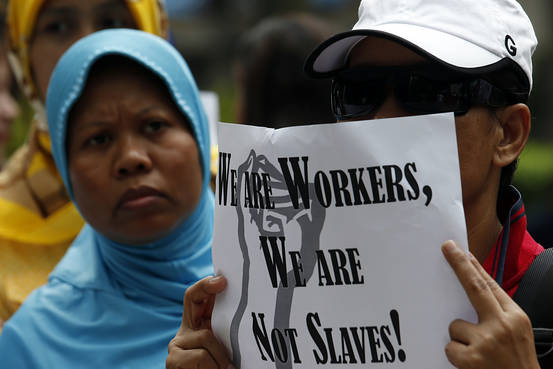
15 March 2016, The Wall Street Journal
The plight of domestic workers in Hong Kong has made headlines in recent years after several high-profile cases in which employers had beat and tortured their helpers. A new study shows that, far from being isolated cases, instances of abuse are more routine and widespread than previously suspected.
A Justice Centre survey (PDF) of more than 1,000 domestic workers found that 17% were engaged in forced labor. That means there could be more than 50,000 domestic workers working under duress among Hong Kong’s population of about 336,000 domestic workers, the vast majority of whom are women from Indonesia and the Philippines.
Among those engaged in forced labor, 14% had been trafficked into it, the survey found.
Domestic workers are tightly woven into the fabric of Hong Kong society, providing the affordable childcare and elderly care that allow parents to work. One in every three households with children employs a helper. Without private spaces of their own, domestic workers flood the city’s parks and sidewalks on Sundays to chat, sing and practice their religion sitting on cardboard boxes or plastic tablecloths.
The most significant predictor of forced labor is whether or not a worker has debt, says Justice Center. Even before a woman starts work as a domestic helper in Hong Kong, she faces a raft of fees: training, recruitment, placement, medical examinations, insurance, certificates, visas and passport fees. Most of these are paid via loans.
More than 35% of respondents had debt burdens equal or greater than 30% of their annual income. Those who secured their jobs at home took on average 7 months to pay off their debts. This locks them into potentially abusive households.
Take the case of Amalia, a 28-year-old Indonesian woman profiled by Justice Centre. Amalia took out a loan to cover her recruitment costs, which totaled US$2,007 (HK$15,576) and was required to attend a training facility in Indonesia, where her passport was confiscated. In Hong Kong, Amalia works 14 hours a day and is given one day off every three weeks. She is paid US$517 (HK$4,010) a month and sends 50% of her salary back to her family in rural Indonesia. Her employment agency has said she can’t quit until she has repaid her debt.
Justice Center classifies unfree recruitment, work and life under duress and the impossibility of leaving as examples of forced labor. This includes workers being locked in training facilities or being required to work 20 hours a day, in the middle of the night, and on the legally mandated one day off. The International Labour Organization defines forced labor as work done involuntarily or under the menace of any penalty.